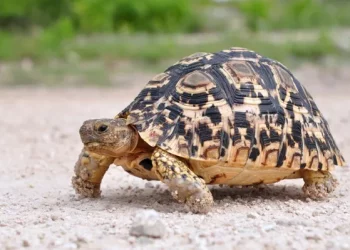Tortoises are fascinating reptiles known for their longevity and unique characteristics. They belong to the family Testudinidae and are characterized by their sturdy, dome-shaped shells and terrestrial lifestyle. Unlike turtles, which are adapted for aquatic habitats, tortoises are land-dwelling creatures that can be found in various regions worldwide, from deserts to grasslands and forests.
Species Characteristics
Physical Features
Tortoises typically have a heavy, rounded shell that serves as protection from predators. Their shells are composed of bone covered by keratin plates, known as scutes, which continue to grow throughout their lives. This feature distinguishes them from turtles, whose shells are generally lighter and flatter for streamlined movement in water.
Size and Lifespan
Tortoises vary in size depending on the species. Some, like the Galápagos tortoise, can grow to immense sizes, while others, such as the Russian tortoise, remain relatively small. Lifespan also varies significantly; many tortoise species can live for several decades, with some reaching over 100 years of age in captivity when provided with proper care.
Diet and Feeding Habits
Tortoises are herbivores, primarily consuming vegetation such as grasses, leafy greens, and occasionally fruits and flowers. Their diets are high in fiber and low in protein, reflecting their adaptation to terrestrial environments where plant matter is abundant. Providing a varied diet rich in calcium and vitamins is essential for their health and well-being.
Living Habits of Tortoises
Habitat Preferences
Tortoises are adapted to specific habitats based on their species. For instance, desert tortoises prefer arid environments with sandy soil and sparse vegetation, whereas species like the red-footed tortoise thrive in tropical forests with high humidity levels. Understanding your tortoise’s natural habitat requirements is crucial for creating a suitable captive environment.
Behavior and Activity Levels
Tortoises are generally solitary animals, except during mating season or in specific circumstances such as shared burrows for shelter. They are known for their slow movement and deliberate pace, which conserves energy and minimizes exposure to predators. Observing your tortoise’s activity levels and behavior patterns can provide insights into its overall health and happiness.
Social Interaction
While tortoises are not social in the same way mammals or birds are, they can display social behaviors such as courtship rituals during mating season. Some species may also tolerate the presence of other tortoises or compatible species in shared enclosures, though careful monitoring is necessary to prevent aggression or territorial disputes.
See Also: How Often Should I Give My Tortoise Calcium?
Signs of a Happy Tortoise
Healthy Appetite
A healthy tortoise demonstrates a robust appetite and eagerly consumes a varied diet of leafy greens, vegetables, and occasional fruits. Lack of appetite or refusal to eat can indicate underlying health issues or stress.
Active Exploration
A content tortoise will engage in regular exploration of its environment, moving around its enclosure or outdoor habitat to forage for food, investigate objects, or bask under heat sources. A lethargic tortoise that remains inactive for extended periods may be experiencing health problems or stress.
Basking and Thermoregulation
Tortoises require access to a temperature gradient within their habitat to regulate their body temperature effectively. A happy tortoise will bask under heat lamps or UVB bulbs provided in its enclosure, alternating between basking and cooler areas to maintain optimal body temperature and metabolic function.
Shell and Skin Health
The condition of a tortoise’s shell and skin is a clear indicator of its overall health. A healthy tortoise will have a smooth, evenly colored shell with well-defined scutes. Signs of shell deformities, discoloration, or soft spots can indicate nutritional deficiencies or metabolic bone disease, which require prompt veterinary attention.
Environmental Enrichment
Providing environmental enrichment such as hiding spots, natural substrates, and objects for climbing or digging encourages natural behaviors and mental stimulation in tortoises. A happy tortoise will actively interact with enrichment items, exhibiting curiosity and engagement with its surroundings.
Vocalizations and Communication
While tortoises are not vocal animals, they may express contentment through subtle behaviors such as relaxed posture, extended neck and limbs, and occasional hissing or grunting sounds during mating or feeding. Understanding your tortoise’s unique behavioral cues can help you recognize signs of happiness and well-being.
Conclusion
Understanding how to recognize signs of happiness in your tortoise involves observing its behavior, appetite, activity levels, and physical health. By providing a suitable habitat that meets its species-specific needs and offering a balanced diet, you can ensure your tortoise thrives in captivity. Regular veterinary check-ups and proactive care are essential for maintaining your tortoise’s long-term health and happiness. With proper attention to its welfare and environmental enrichment, you can foster a content and healthy life for your tortoise companion.
Related Topics:

























